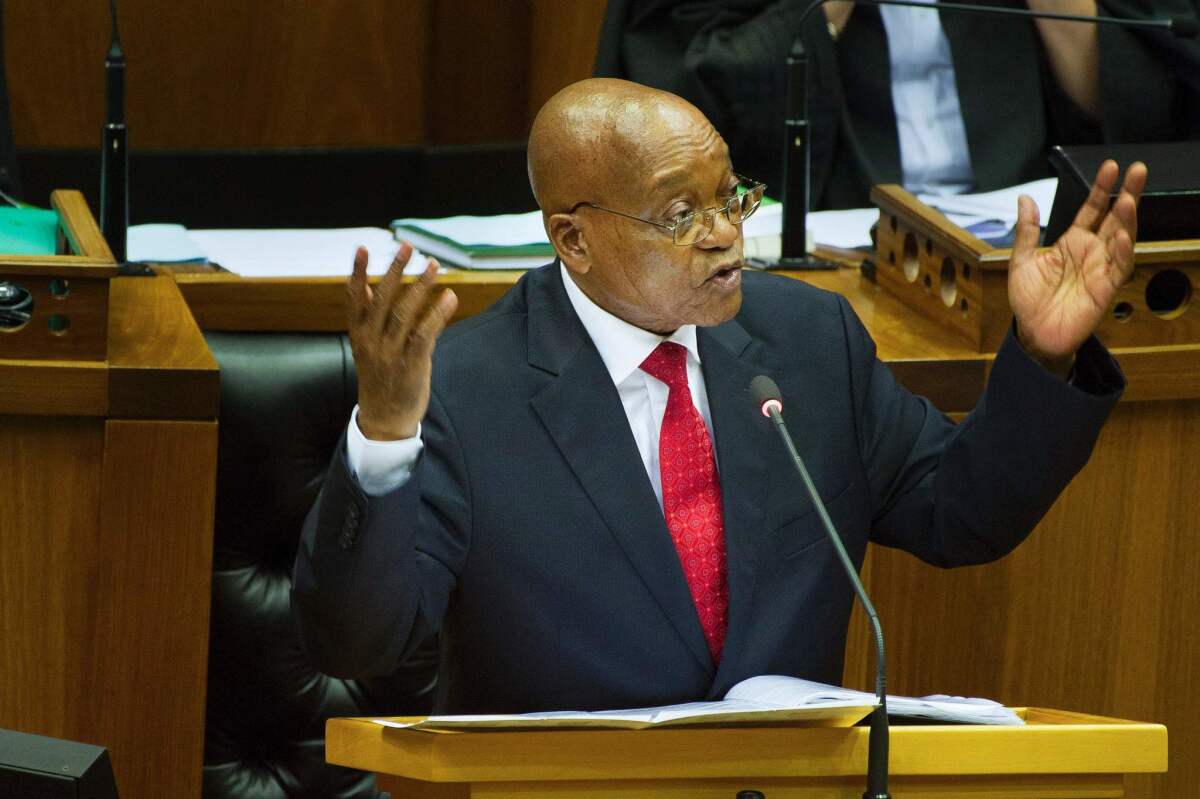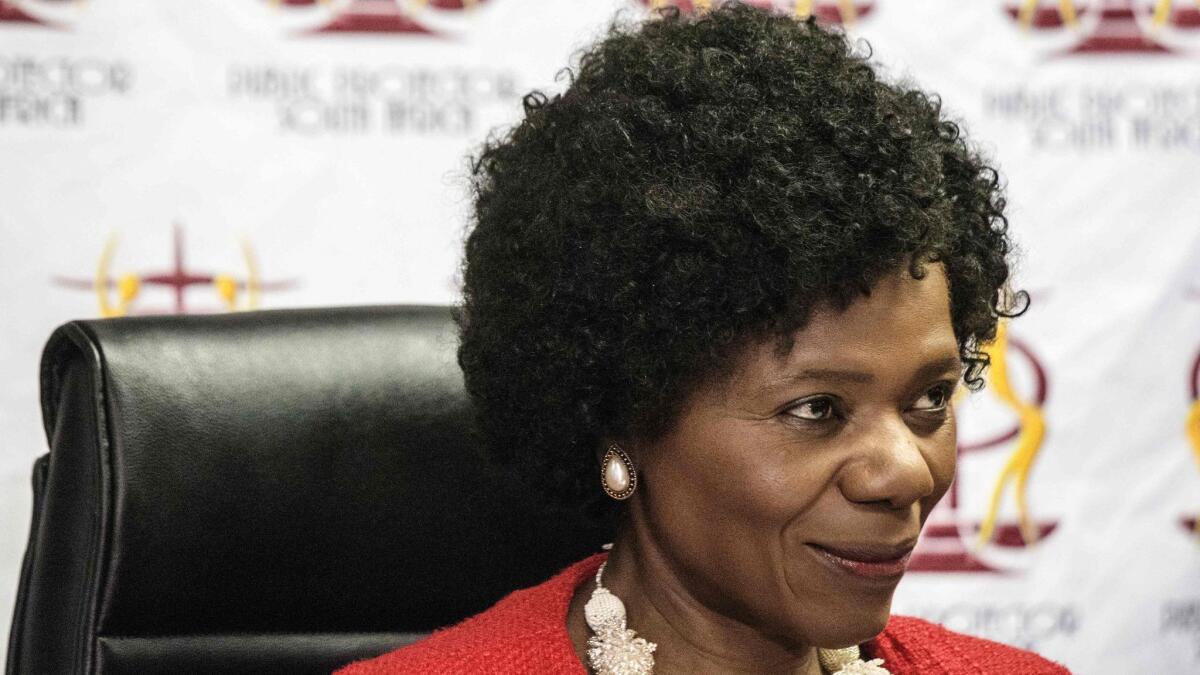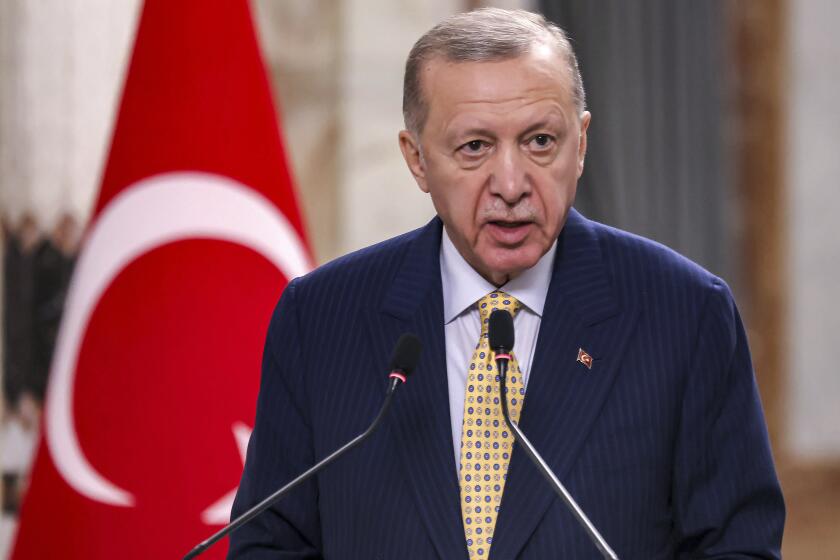South Africa’s Jacob Zuma faces a no-confidence vote as he fights for political survival

South African President Jacob Zuma answers during a session of questions to the president at the South African Parliament in Cape Town on Nov. 23.
South African President Jacob Zuma was fighting for his political survival Monday, ambushed by a surprise no-confidence vote launched by his opponents in the governing party, the African National Congress.
Zuma has waged a struggle in recent months to hang on as president amid deep divisions in the ANC over his leadership. A series of senior figures have called for him to go, after accusations he allowed members of a powerful family, who are in business with his son, to influence Cabinet appointments and to benefit from government contracts.
For the record:
7:28 p.m. Aug. 22, 2019An earlier version of this story said the Gupta family has made more than $500 billion from their business dealings with the South African government. The correct figure is $500 million.
At least four Cabinet ministers and several senior party members called for Zuma’s dismissal during the party’s national executive committee meeting over the weekend and Monday, local media reported. Among them was the tourism minister, Derek Hanekom, who proposed the no-confidence vote Saturday, triggering a bitter three-day struggle.
The executive committee has the power to topple Zuma as the country’s president, but it cannot remove him as party leader.

Zuma’s links to the wealthy Gupta family were exposed in a report by South Africa’s public protector — an ombudsman-like figure — earlier this month. The report by Thuli Madonsela stopped short of accusing Zuma of breaking the law but called on him to set up a judicial inquiry into the influence of the Gupta family, which has interests in mining, the arms industry and media.
Zuma has indicated he will challenge the report in court. The Gupta family has denied any wrongdoing.
In the past year Zuma has been weakened by successive political controversies, including a scandal over his use of public funds to partially pay for upgrades to his personal home in Nkandla. The Constitutional Court ruled in March that Zuma breached the constitution by ignoring a recommendation by the public protector that he repay the funds. He has since repaid the money, around $540,000.
Another concern centered on the ANC’s disastrous performance in municipal elections in August, when it lost control of three major cities, Johannesburg, Pretoria and Port Elizabeth, to the opposition. (Cape Town was in opposition hands before August and remains so.)
The no-confidence debate in the executive committee comes with sluggish economic growth of less than 1% and unemployment at more than 27%, a figure that excludes those who have given up searching for work. State-owned enterprises such as South African Airways and the electricity provider Eskom are losing millions.
A ratings agency, Fitch, warned Friday that political infighting would likely continue to distract the ANC in the coming year. The agency dropped its outlook for South Africa to negative, signaling a possible downgrade to junk status in the future. Moody’s warned Saturday that divisions in the governing party, low growth and high unemployment posed the greatest threats to South Africa. But neither of the agencies downgraded South Africa, as was feared.
A third ratings agency, Standard & Poor’s, is due to announce its decision on South Africa later this week.
Zuma, 74, has grown weaker since last December, when he fired the finance minister, Nhlanhla Nene, replacing him with a little-known ally, David van Rooyen. The South African currency, the rand, plunged on markets and Zuma was forced to reverse the decision four days later.
He appointed Pravin Gordhan to the job but relations between the two have been tense. The National Prosecuting Authority last month filed fraud charges against Gordhan but dropped them in a move perceived by South African analysts as a blow to Zuma. Senior ANC figures have claimed the charges against the minister were political.
Monday’s vote in the national executive committee — a body that until recently was strongly behind Zuma — indicated waning support for the president, with analysts predicting that his opponents will continue to struggle for his dismissal, even if they lose Monday’s vote
In recent months, disquiet about Zuma’s leadership has grown among senior ANC figures, including a former finance minister, Trevor Manuel, an apartheid struggle veteran, Ahmed Kathrada, and other former government ministers. Several unions allied with the ANC have also called on Zuma to step down.
In a symbolic move, the Nelson Mandela Foundation, set up by the country’s revered former president and ANC leader, said last month that Zuma had “failed the test” of national leadership, and called on the governing party to put the country in safe hands.
Zuma is due to remain in office until elections in 2019, but the party is to hold a national conference next year to select his successor. The two strongest leadership rivals are Deputy President Cyril Ramaphosa and the chairwoman of the African Union commission, Nkosazana Dlamini-Zuma, Zuma’s ex-wife. Ramaphosa has the backing of the powerful trade union council, COSATU.
Zuma, the illiterate son of a domestic worker, was head of the ANC’s underground military intelligence wing during the apartheid era and was jailed alongside Mandela. Zuma learned to read in prison on Robben Island, where he served a 10-year sentence.
If he is toppled, Zuma would be the second South African president to be removed by the ANC in office, after Thabo Mbeki was sacked by the National Executive Committee in 2008, paving the way for Zuma to become president in 2009.
Mbeki joined the chorus of Zuma critics this month when he said South Africa was in a state of despair because of corruption and looting of state resources.
Zuma has survived several no-confidence votes in the parliament, most recently on Nov. 10. The ANC has dominated South Africa’s parliament since the first democratic vote in 1994 and its support in national elections hasn’t dropped below 60%. The August municipal elections marked the first significant repudiation of the party by voters, although only at the local level, when its support fell to about 54%.
The slump in support in the August poll raised fears that the party could face similar voter disaffection in national elections in 2019.
The Gupta family, Ajay, Atul and Rajesh Gupta, who have made more $500 million out of their business dealings with the South African government, boasted to a government official in October 2015 that they had made Zuma’s son, Duduzane, into a multimillionaire, according to testimony revealed in the public protector’s report.
Zuma is due to meet the ANC’s integrity committee later this week to answer questions about the state of the government under his leadership. The committee doesn’t have the power to remove him but could recommend that the executive committee do so.
He also faces the possibility of having to face 783 corruption and racketeering charges, dropped just before he came into office as president in 2009. In April, the High Court overturned that decision, a decision Zuma has appealed.
ALSO
Under mounting criticism, South African President Jacob Zuma survives another no-confidence vote
The driving school with live, moving hazards that prepares drivers for Nigeria’s crazy roads
Despite Fidel Castro’s death, few expect rapid political changes in Cuba
More to Read
Sign up for Essential California
The most important California stories and recommendations in your inbox every morning.
You may occasionally receive promotional content from the Los Angeles Times.








